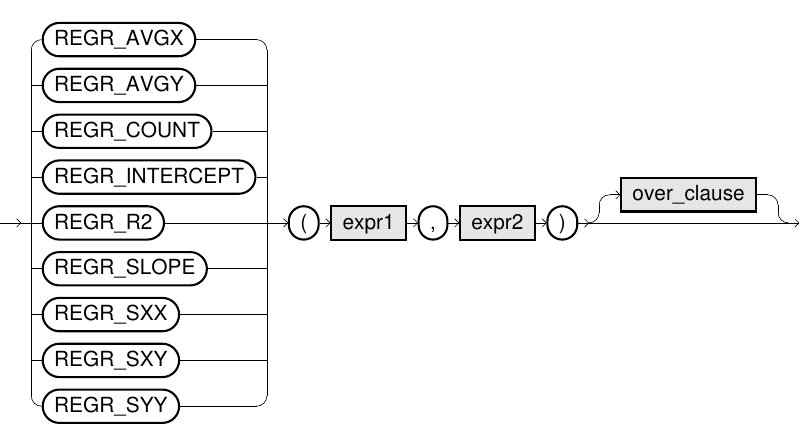Purpose
With the help of the linear regression functions you can determine a least-square regression line.
Syntax
regr_functions::=

Usage notes
- If either
expr1orexpr2isNULL, then the corresponding number pair is not considered for the computation. - Exasol interprets
expr2as independent variable (x value) andexpr1as dependent variable (y value).
Regression functions
-
REGR_SLOPE -
The slope of the regression line

-
REGR_INTERCEPT -
The y-intercept of the regression line

-
REGR_COUNT -
The number of non-NULL number pairs
-
REGR_R2 -
The coefficient of determination (goodness of fit)

-
REGR_AVGX -
The average of the independent values (x values)

-
REGR_AVGY -
The average of the dependent values (y values)

-
REGR_SXX -
Auxiliary function

-
REGR_SXY -
Auxiliary function

-
REGR_SYY -
Auxiliary function

Examples
Query using REGR_COUNT
SELECT
id, department, hire_date,
REGR_COUNT(starting_salary, current_salary)
OVER (PARTITION BY department ORDER BY hire_date) REGR_COUNT
FROM employee_table ORDER BY department, hire_date;Result
| ID | DEPARTMENT | HIRE_DATE | REGR_COUNT |
| 2005 | ACCOUNTS | 2013-01-01 | 1 |
| 2003 | ACCOUNTS | 2015-07-01 | 2 |
| 2002 | ACCOUNTS | 2017-01-01 | 4 |
| 2004 | ACCOUNTS | 2017-01-01 | 4 |
| 2001 | ACCOUNTS | 2018-07-01 | 5 |
| 1003 | HR | 2014-01-01 | 1 |
| 1002 | HR | 2016-01-01 | 3 |
| 1004 | HR | 2016-01-01 | 3 |
| 1001 | HR | 2018-07-01 | 4 |
Query using REGR_INTERCEPT
SELECT
id, department, hire_date,
REGR_INTERCEPT(starting_salary, current_salary)
OVER (PARTITION BY department ORDER BY hire_date) REGR_INTERCEPT
FROM employee_table ORDER BY department, hire_date;Result
| ID | DEPARTMENT | HIRE_DATE | REGR_INTERCEPT |
| 2005 | ACCOUNTS | 2013-01-01 | NULL |
| 2003 | ACCOUNTS | 2015-07-01 | NULL |
| 2002 | ACCOUNTS | 2017-01-01 | 96666.667 |
| 2004 | ACCOUNTS | 2017-01-01 | 96666.6674 |
| 2001 | ACCOUNTS | 2018-07-01 | 46000 |
| 1003 | HR | 2014-01-01 | NULL |
| 1002 | HR | 2016-01-01 | 57500 |
| 1004 | HR | 2016-01-01 | 57500 |
| 1001 | HR | 2018-07-01 | 70757.576 |
Query using REGR_SLOPE
SELECT
id, department, hire_date,
REGR_SLOPE(starting_salary, current_salary)
OVER (PARTITION BY department ORDER BY hire_date) REGR_SLOPE
FROM employee_table ORDER BY department, hire_date;Result
| ID | DEPARTMENT | HIRE_DATE | REGR_SLOPE |
| 2005 | ACCOUNTS | 2013-01-01 | NULL |
| 2003 | ACCOUNTS | 2015-07-01 | NULL |
| 2002 | ACCOUNTS | 2017-01-01 | -0.66666667 |
| 2004 | ACCOUNTS | 2017-01-01 | -0.66666667 |
| 2001 | ACCOUNTS | 2018-07-01 | 0 |
| 1003 | HR | 2014-01-01 | NULL |
| 1002 | HR | 2016-01-01 | -0.25 |
| 1004 | HR | 2016-01-01 | -0.25 |
| 1001 | HR | 2018-07-01 | -0.41414141 |
